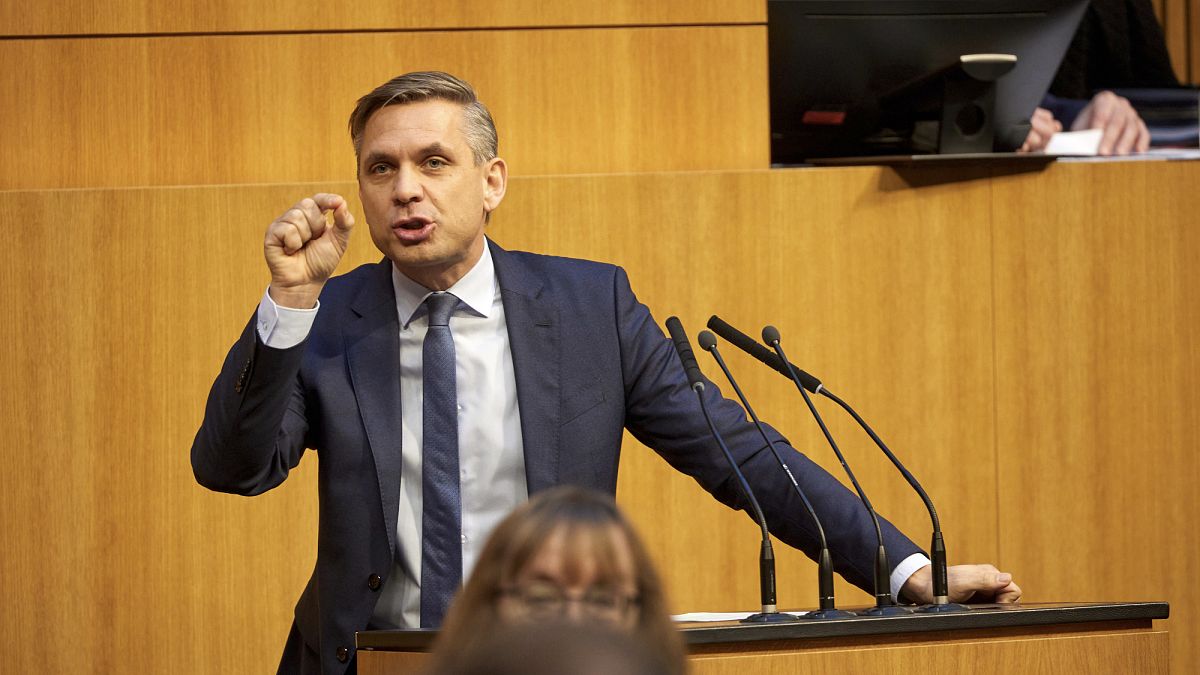Europe
Austrian trade and industry bodies call for Green Deal reversal

A Call for Simplification: EU’s Green Deal Under Scrutiny
The European Union’s Green Deal, a landmark initiative aimed at driving sustainable growth and reducing environmental impact, has come under increasing scrutiny as businesses and policymakers call for a rollback of certain regulations. At the forefront of this debate is Wolfgang Hattmannsdorfer, the head of Austria’s chamber of commerce and a prominent conservative politician. In a detailed letter to EU Economy Commissioner Valdis Dombrovskis, Hattmannsdorfer argued that the Corporate Sustainability and Due Diligence Directive (CSDDD) must either be "significantly simplified or dismissed altogether." This directive, which requires businesses operating in Europe to ensure that their global supply chains are free from environmental or human rights violations, has been a cornerstone of the Green Deal since its adoption under President Ursula von der Leyen’s leadership.
Hattmannsdorfer’s concerns are echoed by other Austrian trade and industry bodies, which have joined forces to urge the European Commission to reassess a wide range of environmental laws introduced as part of the Green Deal. Their criticisms center on the growing burden of bureaucracy, which they argue is stifling competitiveness and hampering businesses’ ability to operate effectively. “Bureaucracy has reached proportions that can no longer be tolerated,” Hattmannsdorfer warned in a recent statement. His remarks reflect a broader sentiment among European industries, which are calling for a more streamlined approach to sustainability regulations.
The Regulatory Burden: Key Areas of Concern
The criticism leveled at the Green Deal extends beyond the CSDDD. Hattmannsdorfer and his allies have identified several key areas of concern, including the upcoming Carbon Border Adjustment Mechanism (CBAM), which imposes a border tax on imported goods based on their carbon footprint. The Deforestation Regulation, which aims to curb the trade of products linked to deforestation, has also come under fire, with its implementation already delayed due in part to opposition from Austria. Additionally, the Packaging and Packaging Waste Directive, designed to reduce disposable waste and plastic use, and the Ecodesign Regulation, which promotes the creation of more durable and energy-efficient products, are among the measures being challenged.
The list of contentious regulations also includes a ban on products linked to forced labor and the Corporate Sustainability Reporting Directive (CSRD), which mandates companies to disclose their environmental and social impacts. Insurers and other industry groups have joined the chorus, urging the Commission to simplify these rules and reduce reporting obligations. The European insurance industry lobby, for instance, has called for an immediate halt to the development of sector-specific reporting requirements under the CSRD, arguing that the current framework is overly complex and impractical.
The Broader Political Context: Competitiveness vs. Sustainability
The debate over the Green Deal regulations is taking place against a backdrop of shifting political priorities in the EU. With the second von der Leyen Commission increasingly focused on enhancing global competitiveness, there is growing pressure to revisit the ambitious environmental agenda set out in the Green Deal. Conservative lawmakers and business leaders argue that while the Green Deal’s climate targets remain essential, the associated regulatory burdens are undermining Europe’s ability to compete on the world stage. “We must preserve the core of the Green Deal, in particular the climate targets, but unfortunately, there is far too much unnecessary bureaucracy, and this must be removed,” said Peter Liese, the European People’s Party’s lead on environmental policy.
This sentiment is not universally shared, however. Environmental advocates and civil society groups are urging the EU to resist what they see as a deregulatory push that could weaken the Green Deal’s core objectives. “The Commission must resist the siren song of deregulation,” warned Patrick ten Brink, secretary general of the European Environmental Bureau. “The 2025 work programme raises questions about the Commission’s commitment to staying the course on the Green Deal, particularly when it comes to the Zero Pollution ambition.”
The Commission’s 2025 Work Programme: Balancing Growth and Sustainability
In response to these pressures, the European Commission has announced plans to introduce a series of “omnibus packages” aimed at reducing red tape while maintaining the Green Deal’s key sustainability goals. The 2025 work programme, published earlier this year, outlines three major packages to be released before the summer, including a sustainability package due on 26 February. This package will be followed by reviews of rules on investments and mid-cap companies, a category larger than SMEs that is set to benefit from wide exemptions from reporting obligations.
While these measures are intended to strike a balance between competitiveness and sustainability, they have sparked concerns among environmentalists, who fear that the focus on deregulation may come at the expense of critical Green Deal objectives. The Clean Industrial Deal, a flagship initiative aimed at combining growth and competitiveness with increased sustainability, and an action plan to reduce energy costs, are also set to be published alongside these packages.
The Way Forward: Navigating the Tensions Between Business and the Environment
As the EU grapples with the challenges of implementing the Green Deal, the debate over regulation highlights the delicate balance that must be struck between economic competitiveness and environmental sustainability. While businesses and conservative lawmakers argue that the current regulatory framework is stifling growth, environmental advocates warn that any rollback of the Green Deal’s provisions could undermine efforts to address the climate crisis.
The coming months will be pivotal in determining the future of the Green Deal. With the Commission’s omnibus packages set to redefine the regulatory landscape, the EU must navigate these competing priorities with care. As the debate rages on, one thing is clear: the path to a sustainable and competitive Europe will require careful compromise—and a willingness to listen to the concerns of both businesses and environmentalists alike.


















